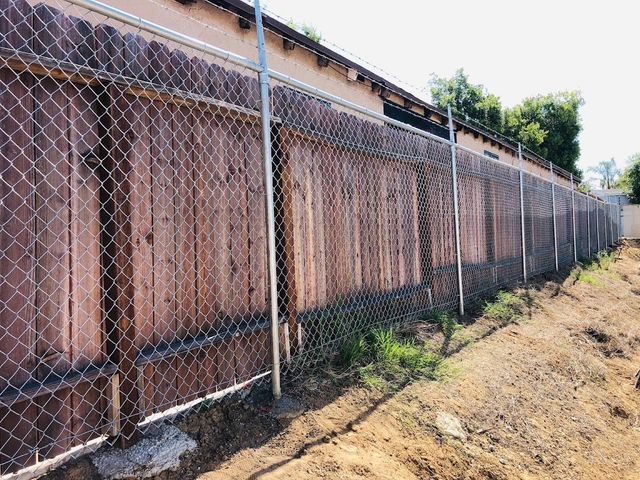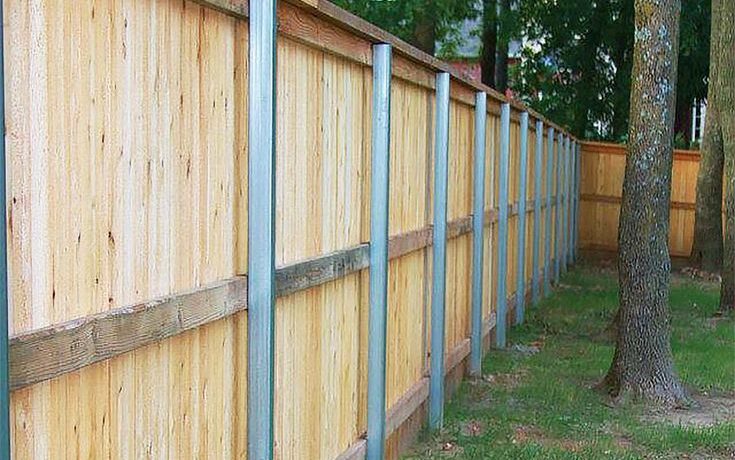All Categories
Featured
Selecting the ideal secure fencing product for your building is a significant choice, and each alternative includes its own collection of advantages and challenges. Wood, vinyl, and light weight aluminum are amongst one of the most popular materials for both business and household fence. Right here's a failure of the benefits and drawbacks of each to assist you determine which is finest for your needs.
Wood Fence. Pros:
Aesthetic Appeal: Wood offers an ageless, all-natural look that enhances nearly any kind of style of building. It can be painted or tarnished in a wide variety of colors, permitting total modification. Whether you're going for a rustic, country-style appearance or a more refined and polished look, timber is flexible.
Affordable: Usually, wood fencings are among the most affordable alternatives when it concerns upfront expenses. It's a great alternative for those on a spending plan who desire a high quality fencing without a high price tag.
![]()
Modification: Timber can be easily adjusted to fit any type of shape or dimension. You can select from different designs such as personal privacy, picket, or ranch-style fences. It's also simple to change, repair, or change parts if needed.
Disadvantages:
Maintenance: Wood fencings need regular upkeep. They should be stained or painted regularly to avoid pest, bending, or rot problem. Without upkeep, timber can wear away quicker, specifically in damp or damp climates.
Vulnerability to Damages: Wood is vulnerable to damage from pests, such as termites, and weather problems, like high winds, rain, or snow. In time, exposure to these components can cause the wood to split, splinter, or warp.
Shorter Life expectancy: While timber fencings can last for numerous years, they normally have a shorter life expectancy compared to plastic or light weight aluminum, especially otherwise kept routinely.
Vinyl Fence. Pros:
Reduced Maintenance: Among one of the most appealing attributes of vinyl fences is that they need little to no upkeep. Unlike wood, plastic does not need to be repainted or stained. It's resistant to fading, cracking, and bending, making it suitable for those that want a convenient fencing.
Durability: Vinyl fences are unbelievably resilient and can hold up against rough weather condition problems, consisting of severe warm, hefty rain, or snow. They're also resistant to insects like termites, which can destroy timber fencings.
Long Life-span: Vinyl fencings can last for 20-30 years or even more with very little maintenance. Numerous makers use warranties, giving comfort and additional boosting the value of your investment.
![]()
Range of Styles: Readily available in a variety of textures, designs, and shades, vinyl fencings can resemble the appearance of wood but without the maintenance. They are offered stylishly like personal privacy, picket, and decorative, making them extremely adjustable.
Cons:
Higher Initial Price: The upfront price of plastic secure fencing is normally greater than wood, making it much less budget-friendly for some. Its long life and low upkeep make it a beneficial investment in the lengthy run.
Weak in Cold Climate: In cooler environments, vinyl can end up being fragile in time, which makes it extra susceptible to breaking if subjected to influence. This might be an issue in areas with harsh winter seasons.
Minimal Modification: While plastic can be found in a variety of designs and shades, it's not as adjustable as timber. If you have a really details vision in mind, plastic may not be the best selection.
Aluminum Fencing. Pros:
Reduced Maintenance: Aluminum is another product that needs very little maintenance. Unlike wood, it does not rust, rust, or fade. This makes it excellent for environments with extreme climate or seaside locations where deep sea might trigger deterioration.
Resilience: Aluminum fences are known for their stamina and lengthy life expectancy. They can hold up against harsh climate, and unlike timber or plastic, they are immune to parasites and won't degrade in time.
![]()
Aesthetic Charm: Light weight aluminum fences offer a streamlined, sophisticated appearance and are commonly used for decorative objectives. They are offered in numerous designs and surfaces and can boost the overall visual allure of your residential or commercial property.
Safety: Aluminum is a sturdy material, making it an outstanding choice for giving safety around your home. It's typically made use of for property safety fencing along with for swimming pool units.
Cons:
Expense: Aluminum fences are frequently more expensive than timber and often also vinyl, specifically when selecting attractive or custom styles. The first cost may be a deterrent for some homeowner.
Less Privacy: Among the disadvantages of light weight aluminum is that it normally supplies much less personal privacy compared to timber or plastic. The gaps between the slats or bars can be wide, which allows individuals to see via the fencing. This may not be the best option. if personal privacy is essential to you.
Denting: While light weight aluminum is resilient, it is at risk to denting from hefty influences, such as cars and truck accidents or criminal damage. While it will not corrosion, a damage can jeopardize its look and stability.
Which Material Should You Pick? The choice between plastic, wood, and light weight aluminum fencing comes down to your spending plan, the quantity of maintenance you're willing to handle, and the details requirements of your building. If you like a natural, adjustable look and are ready to preserve it, wood might be the method to go.
Consider your residential property's climate, the level of privacy or safety you need, and the long-lasting financial investment you agree to make. Whichever material you choose, each deals distinct benefits that can enhance your home or service while providing performance and style.
Wood Fence. Pros:
Aesthetic Appeal: Wood offers an ageless, all-natural look that enhances nearly any kind of style of building. It can be painted or tarnished in a wide variety of colors, permitting total modification. Whether you're going for a rustic, country-style appearance or a more refined and polished look, timber is flexible.
Affordable: Usually, wood fencings are among the most affordable alternatives when it concerns upfront expenses. It's a great alternative for those on a spending plan who desire a high quality fencing without a high price tag.

Modification: Timber can be easily adjusted to fit any type of shape or dimension. You can select from different designs such as personal privacy, picket, or ranch-style fences. It's also simple to change, repair, or change parts if needed.
Disadvantages:
Maintenance: Wood fencings need regular upkeep. They should be stained or painted regularly to avoid pest, bending, or rot problem. Without upkeep, timber can wear away quicker, specifically in damp or damp climates.
Vulnerability to Damages: Wood is vulnerable to damage from pests, such as termites, and weather problems, like high winds, rain, or snow. In time, exposure to these components can cause the wood to split, splinter, or warp.
Shorter Life expectancy: While timber fencings can last for numerous years, they normally have a shorter life expectancy compared to plastic or light weight aluminum, especially otherwise kept routinely.
Vinyl Fence. Pros:
Reduced Maintenance: Among one of the most appealing attributes of vinyl fences is that they need little to no upkeep. Unlike wood, plastic does not need to be repainted or stained. It's resistant to fading, cracking, and bending, making it suitable for those that want a convenient fencing.
Durability: Vinyl fences are unbelievably resilient and can hold up against rough weather condition problems, consisting of severe warm, hefty rain, or snow. They're also resistant to insects like termites, which can destroy timber fencings.
Long Life-span: Vinyl fencings can last for 20-30 years or even more with very little maintenance. Numerous makers use warranties, giving comfort and additional boosting the value of your investment.

Range of Styles: Readily available in a variety of textures, designs, and shades, vinyl fencings can resemble the appearance of wood but without the maintenance. They are offered stylishly like personal privacy, picket, and decorative, making them extremely adjustable.
Cons:
Higher Initial Price: The upfront price of plastic secure fencing is normally greater than wood, making it much less budget-friendly for some. Its long life and low upkeep make it a beneficial investment in the lengthy run.
Weak in Cold Climate: In cooler environments, vinyl can end up being fragile in time, which makes it extra susceptible to breaking if subjected to influence. This might be an issue in areas with harsh winter seasons.
Minimal Modification: While plastic can be found in a variety of designs and shades, it's not as adjustable as timber. If you have a really details vision in mind, plastic may not be the best selection.
Aluminum Fencing. Pros:
Reduced Maintenance: Aluminum is another product that needs very little maintenance. Unlike wood, it does not rust, rust, or fade. This makes it excellent for environments with extreme climate or seaside locations where deep sea might trigger deterioration.
Resilience: Aluminum fences are known for their stamina and lengthy life expectancy. They can hold up against harsh climate, and unlike timber or plastic, they are immune to parasites and won't degrade in time.

Aesthetic Charm: Light weight aluminum fences offer a streamlined, sophisticated appearance and are commonly used for decorative objectives. They are offered in numerous designs and surfaces and can boost the overall visual allure of your residential or commercial property.
Safety: Aluminum is a sturdy material, making it an outstanding choice for giving safety around your home. It's typically made use of for property safety fencing along with for swimming pool units.
Cons:
Expense: Aluminum fences are frequently more expensive than timber and often also vinyl, specifically when selecting attractive or custom styles. The first cost may be a deterrent for some homeowner.
Less Privacy: Among the disadvantages of light weight aluminum is that it normally supplies much less personal privacy compared to timber or plastic. The gaps between the slats or bars can be wide, which allows individuals to see via the fencing. This may not be the best option. if personal privacy is essential to you.
Denting: While light weight aluminum is resilient, it is at risk to denting from hefty influences, such as cars and truck accidents or criminal damage. While it will not corrosion, a damage can jeopardize its look and stability.
Which Material Should You Pick? The choice between plastic, wood, and light weight aluminum fencing comes down to your spending plan, the quantity of maintenance you're willing to handle, and the details requirements of your building. If you like a natural, adjustable look and are ready to preserve it, wood might be the method to go.
Consider your residential property's climate, the level of privacy or safety you need, and the long-lasting financial investment you agree to make. Whichever material you choose, each deals distinct benefits that can enhance your home or service while providing performance and style.
Latest Posts
Explore Limited-Time Auto Repair Specials in Chicago at Montclare Auto Repair
Published May 23, 25
1 min read
Learn About Montclare Auto Repair’s Most Popular Services and Why Drivers Trust Them
Published May 23, 25
1 min read
Enhance Your Residential Property with Expenses Door Equipment
Published May 21, 25
1 min read
More
Latest Posts
Explore Limited-Time Auto Repair Specials in Chicago at Montclare Auto Repair
Published May 23, 25
1 min read
Learn About Montclare Auto Repair’s Most Popular Services and Why Drivers Trust Them
Published May 23, 25
1 min read
Enhance Your Residential Property with Expenses Door Equipment
Published May 21, 25
1 min read